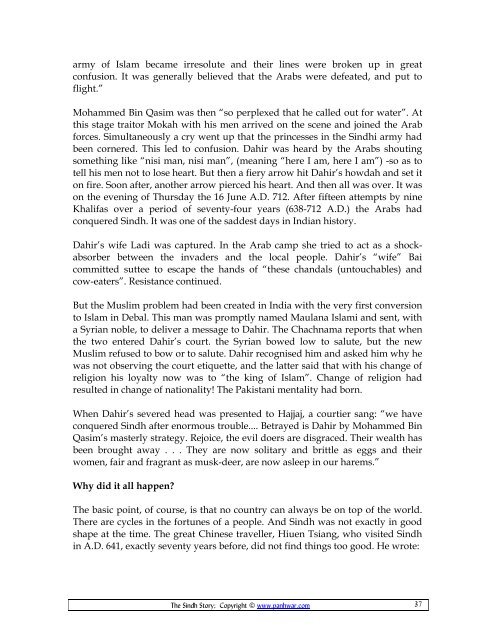Create successful ePaper yourself
Turn your PDF publications into a flip-book with our unique Google optimized e-Paper software.
army of Islam became irresolute and their lines were broken up in great<br />
confusion. It was generally believed that the Arabs were defeated, and put to<br />
flight.”<br />
Mohammed Bin Qasim was then “so perplexed that he called out for water”. At<br />
this stage traitor Mokah with his men arrived on the scene and joined the Arab<br />
forces. Simultaneously a cry went up that the princesses in the Sindhi army had<br />
been cornered. This led to confusion. Dahir was heard by the Arabs shouting<br />
something like “nisi man, nisi man”, (meaning “here I am, here I am”) -so as to<br />
tell his men not to lose heart. But then a fiery arrow hit Dahir’s howdah and set it<br />
on fire. Soon after, another arrow pierced his heart. And then all was over. It was<br />
on the evening of Thursday the 16 June A.D. 712. After fifteen attempts by nine<br />
Khalifas over a period of seventy-four years (638-712 A.D.) the Arabs had<br />
conquered Sindh. It was one of the saddest days in Indian history.<br />
Dahir’s wife Ladi was captured. In the Arab camp she tried to act as a shockabsorber<br />
between the invaders and the local people. Dahir’s “wife” Bai<br />
committed suttee to escape the hands of “these chandals (untouchables) and<br />
cow-eaters”. Resistance continued.<br />
But the Muslim problem had been created in India with the very first conversion<br />
to Islam in Debal. This man was promptly named Maulana Islami and sent, with<br />
a Syrian noble, to deliver a message to Dahir. The Chachnama reports that when<br />
the two entered Dahir’s court. the Syrian bowed low to salute, but the new<br />
Muslim refused to bow or to salute. Dahir recognised him and asked him why he<br />
was not observing the court etiquette, and the latter said that with his change of<br />
religion his loyalty now was to “the king of Islam”. Change of religion had<br />
resulted in change of nationality! The Pakistani mentality had born.<br />
When Dahir’s severed head was presented to Hajjaj, a courtier sang: “we have<br />
conquered Sindh after enormous trouble.... Betrayed is Dahir by Mohammed Bin<br />
Qasim’s masterly strategy. Rejoice, the evil doers are disgraced. Their wealth has<br />
been brought away . . . They are now solitary and brittle as eggs and their<br />
women, fair and fragrant as musk-deer, are now asleep in our harems.”<br />
Why did it all happen?<br />
The basic point, of course, is that no country can always be on top of the world.<br />
There are cycles in the fortunes of a people. And Sindh was not exactly in good<br />
shape at the time. The great Chinese traveller, Hiuen Tsiang, who visited Sindh<br />
in A.D. 641, exactly seventy years before, did not find things too good. He wrote:<br />
The Sindh Story; Copyright © www.panhwar.com<br />
37


